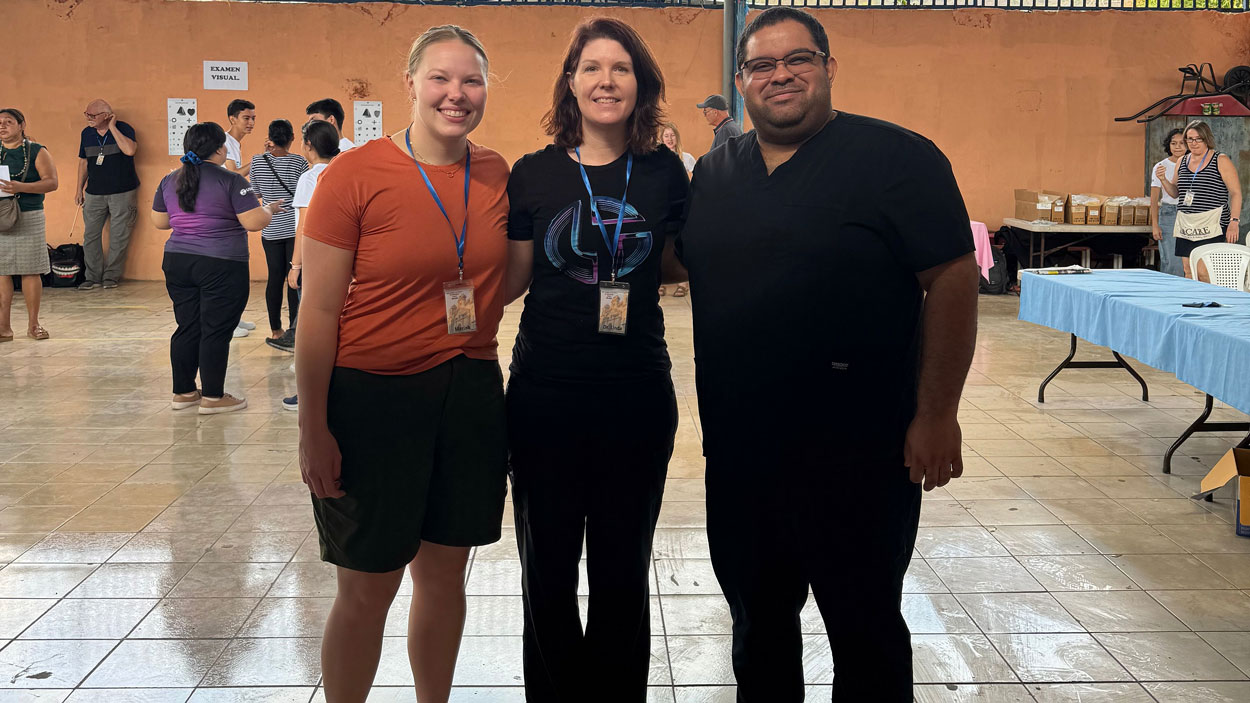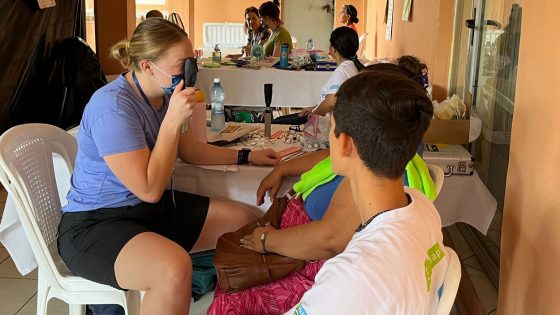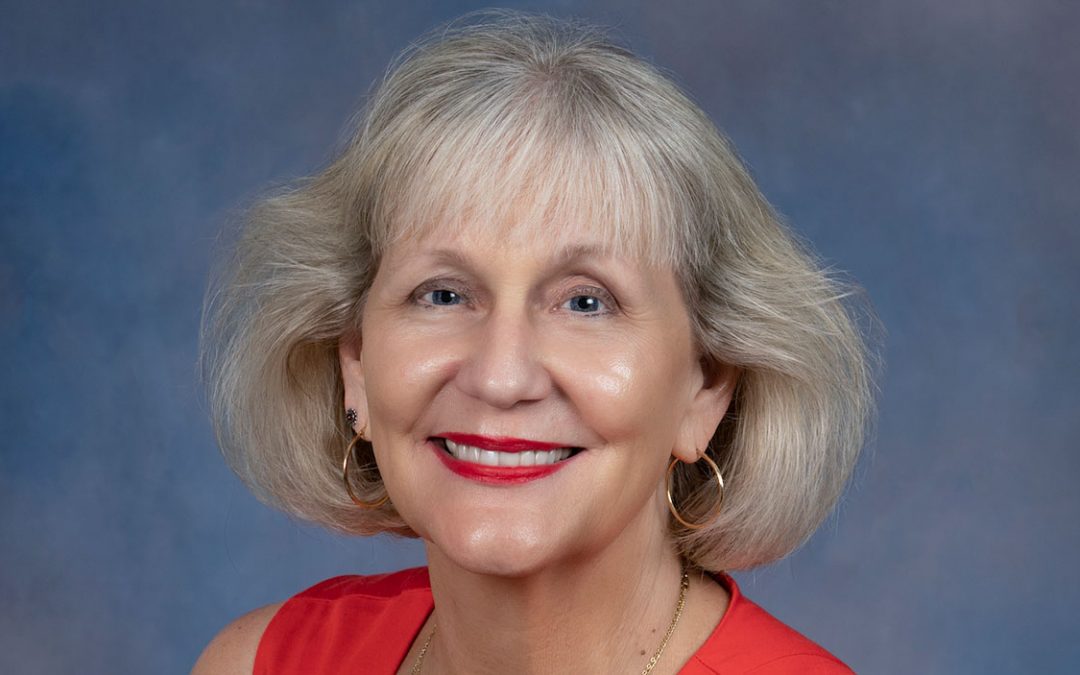
Recent College of Optometry graduates Mariah Strahm (left) and Kevin Pizarro-Miller (right) joined Associate Clinical Professor Dr. Linda Marks (center) on a service trip to El Salvador this spring. (Photo courtesy of Linda Marks)
When caring for patients, Mariah Strahm loves finding a way to compliment them to make them feel welcome in her exam room.
Her Spanish is pretty limited, though, which made things difficult while providing eyecare during a recent service trip to San Alejo, El Salvador, through I Care International in March. With the help of an interpreter, Strahm did her best, such as when she complimented a teenage girl’s earrings while conducting eye exams at a local orphanage. Strahm was moved when, after the exam, the girl came back up to her, wanting to give her the earrings.
While she was touched by the gesture, Strahm asserted that it was absolutely not necessary. Her patient insisted, though, and very joyously and graciously took out her earring and handed it to her. “I was very touched by her deep generosity and thankfulness for a small, brief interaction on my part,” Strahm said. “This trip confirmed that I deeply enjoy humanitarian work and ignited a hopefully long-term love for this type of work.”
Strahm and Kevin Pizarro-Miller, who both graduated from the College of Optometry at the University of Missouri–St. Louis earlier this month, joined Associate Clinical Professor Dr. Linda Marks for the clinic in San Alejo from March 3 to 6. Over the course of four days, the group of 30 volunteers from California, Illinois, Missouri, Indiana and Mexico served about 900 patients in partnership with the Rotary Club of San Miguel.
They set up two clinics, including one at Agape Home, a small congregate center for children and adolescents, and one at the community center in San Alejo. A group of bilingual high school students helped interpret for any doctors who could not speak Spanish.
First, the volunteers took patients’ vitals and blood glucose, measured their visual acuity, and documented the reason for their visit, or chief complaint. Patients were then sent to see an eye doctor or student eye doctor, including Pizarro-Miller, Strahm and Marks. The doctors performed retinoscopy to measure each patient’s refractive error and also examined the health of the retina and the front of their eyes.

Strahm performs retinoscopy to measure a patient’s refractive error. (Photo courtesy of Linda Marks)
After the exams, patients were given a pair of glasses, sunglasses and artificial tears or allergy drops, if needed, which were donated by Alcon. About 60 patients were referred to Dr. Mirian Gomez, a local ophthalmologist, for additional care such as cataract surgery.
Pizarro-Miller had a particularly memorable encounter with a female patient in her mid-sixties who was monocular after losing sight in one eye as a result of complications from cataract surgery. “She was very grateful that we improved her vision in her good eye with glasses, and by extension, improved her quality of life,” Pizarro-Miller said. “The Salvadorans were very grateful for the help we provided and very vocal of their appreciation.”
The opportunity to participate in humanitarian work was a major draw of the College of Optometry for both Pizarro-Miller and Strahm, though the COVID-19 pandemic squashed the chance to participate in that work for several years.
Marks, who recently joined the I Care board of directors after being involved since 2015, recalled the stress of returning to the U.S. from a previous I Care trip in March 2020 with alumni Elizabeth Ditch and Olivia Hoylman, just two days before El Salvador closed its borders. “I’m very thankful we have resumed travel and grateful to continue to work with such a great I Care team,” she said. “The members are always complimentary of the clinical skills, kindness and professionalism of the UMSL Optometry interns.”
The students took opportunities where they could, including when Pizarro-Miller was selected by UMSL’s Student Volunteer Optometric Services to Humanity chapter to participate in an Essilor Luxottica OneSight Foundation event, in which a group of volunteers provided comprehensive eye exams and glasses to underserved populations in Miami. Strahm has volunteered frequently both through the College of Optometry and her church, including engaging with the community during First Fridays at the Saint Louis Science Center, gathering supplies for flood victims and providing vision screenings through the St. Louis Care Fair.
When the opportunity presented itself to provide services in El Salvador, Pizarro-Miller and Strahm both jumped at the chance, eager to combine their skills in health care with their shared passion for helping others in need.
“I love helping others and sharing my skillset,” Strahm says. “I love working alongside people who enjoy what they do. I saw this trip as a sweet opportunity to do all of those things.”
Energized and emboldened by what they experienced in El Salvador, the two hope to continue humanitarian work as they embark on the next steps in their careers.
Strahm has accepted a position at a private practice in Mansfield, Texas, and hopes to join the I Care group for a return trip to El Salvador in 2026. Pizarro-Miller will be completing a residency in low-vision rehabilitation at the University of Incarnate Word–Rosenberg School of Optometry and has a special leave as resident to participate in the school’s humanitarian trips. Afterwards, he would like to work as an optometrist in a hospital setting in order to help patients who need low-vision services, serve as adjunct professor and teach future optometry students, with the flexibility to participate in humanitarian work in his free time.
“I have learned that although we volunteer in humanitarian trips, they also help grow us as people and professionals,” Pizarro-Miller said. “I have found this to be true for the faith-based trips I have participated in since I was a teenager and these two humanitarian trips in optometry school. Another thing I also emphasize to students and my colleagues is to participate in at least one humanitarian trip in their lives. I guarantee your view of life will change for the better, just like mine did.”














